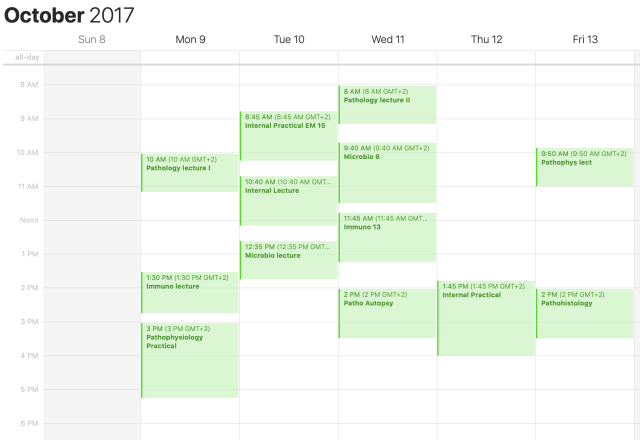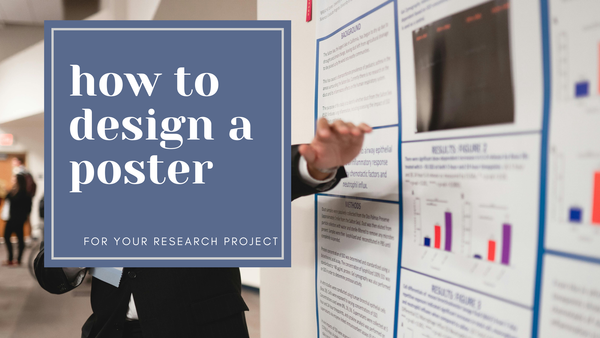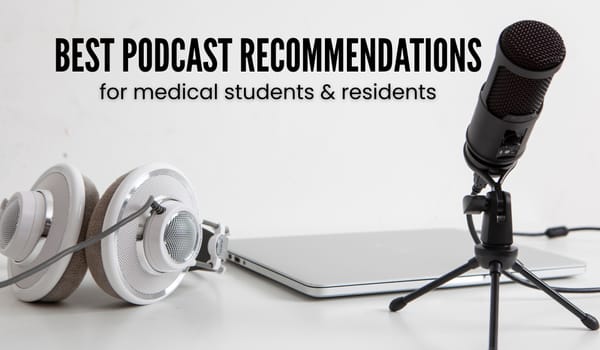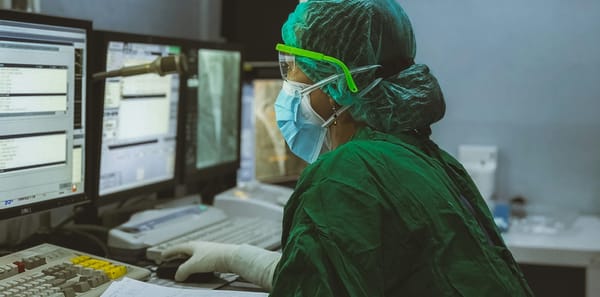How Much Do Med Students Study, Really?
A Closer Look at a Day in the Life Of The answer is simple: it varies insanely.…

A Closer Look at a Day in the Life Of
The answer is simple: it varies insanely. I could do a general post about how much the average med student studies in a day, but since I can’t speak for everyone else, I thought I’d give an insight to what MY study life looks like. This may be very different from others’, but I hope it answers one of my most frequently asked questions.
First off, my med school is in Europe so it’s very different from the States or Canada. It’s a total of 6 years, with 4ish pre-clinical years and 2 totally clinical years. [In third and fourth year we have a mix of some basic classes and some clinicals — I’m currently in my second semester of fourth year.]
Our semester is divided into 14 weeks of classes and about 6 weeks of exam period. Our class schedule differs day to day, but in general we have classes every Monday-Friday and off the weekends (thank heavens). During exam period, we have no classes (woo!) and we schedule our exams however and whenever we want, granted that there are open exam spots.
Please note: I have lived long enough to know that sleep is really important. I truly believe getting enough sleep is crucial to my productivity, and I try to get 7.5 (if not 8) hours of sleep every night. During hectic times this may decrease to 7, but since medical school is a marathon, not a sprint, I feel it’s important to go slowly and steadily — and so I prioritize sleep.
Studying During the Semester: The Beginning
The beginning of each semester is usually very relaxed — we hang out a lot, we do lazy study sessions in loud cafes or in small groups, we have time to exercise AND make home-cooked meals AND sleep 8 hours AND read for fun. Beginning of the semesters is great; to give you an idea of the “mood” of this stage of our semester, this is around the time when one year we were able to take a weekend road trip to Poland.
Here, we often don’t feel the need to study after a long day of classes, and while I try my best to keep up with the lecture material, I must admit that this period of the semester is usually less productive. But not for long…
Studying During the Semester: Midterms are Coming!
For me, this is when I start to get serious. Midterms usually start 4-6 weeks into a new semester, so about 1.5-2 weeks before a given midterm, I start to restructure my life a bit. Now we definitely do find ourselves studying before or after a day of full classes, and weekends become prime study time.
In my experience, something always has to give and I have to prioritize the things I want to keep doing and the things I can let slide for a bit. For example, exercise (going to cardio workout classes) used to be the first thing I gave up when things got a bit more hectic, but this past semester I’ve tried to make myself go even days before a midterm. Usually, home-cooking and reading for pleasure are the first to be sacrificed to the midterm period, and I can usually live without those until after midterms have passed.
Midterm week is also usually when I prioritize which classes to attend, and lectures that I don’t find useful I might end up skipping. We also get a limited number of absences in all practical classes (usually 3/semester), so I might cautiously use one of those to maximize my studying time.
A typical midterm studying day — this is from my 3rd year of medical school, and on days when we ended early (like Tuesdays), I would go to the library to study for a few hours before heading to the gym or home. On Mondays, I usually would be too tired to study, but we would manage to get some small tasks done between classes:

Studying During Exam Period
This is where discipline really comes into play. We no longer have classes and most of us end our obligations for the semester (i.e. researching, volunteering, etc. are now excused). We schedule our own exams, and I typically like to leave time for possible retakes and enough days to feel like I can cover the material thoroughly.
So what does a study week in exam period look like?
Being an early bird, I like to get up as early as possible. This usually means 6-6:30 am., if I can manage it. I don’t usually study at home, so I try to get up and out the door in 30-45 minutes to relocate to my study location for the day. Since I prefer to stay in one place for the entire day (instead of moving from library to cafe or cafe to another cafe), sometimes I bring so much stuff with me that it looks like I’m moving in.
A PRODUCTIVE study day may look like this:
- 7:30-10: first study session
- 10-10:20: breakfast/coffee break
- 10:20-1: second study session
- 1-1:45: lunch break (*I don’t like to take 1 hour lunch breaks — that’s too much and breaks my productivity. I also find that the more I eat, the sleepier I get)
- 2-4: third (and hardest) study session — this is when I usually get really drowsy and productivity goes down. To combat this, this is when I would put on some study music to keep me going.
- 4-4:20: snack time!
- 4:20-7: study study study
- at this point, if it’s close to a big exam, I might stay til 10-11, depending, and go home, pass out, and repeat. Otherwise, I’ll go home to join the boyfriend for dinner, watch a few episodes of a sitcom or sleep early.
Productive study days are usually measured in hours spent focusing, and this year I started using the Flipd app.*
*It’s free to use Flipd as a Pomodoro timer and you’re welcome to join my study room, but my favorite feature (the FlipdOff function) is a premium feature. If you are interested in premium, you can get it at 2/3rds the price, at $10/year using MEDSTUDENT10 as a promo code.
How about an UNPRODUCTIVE study day?
An unproductive study day might be very similar but with MUCH LONGER breaks and less focused studying. It really depends — I can have unproductive days without any reason, or because I’m getting constant phone calls or because family keeps interrupting or what have you.
Unproductive days happen. I’m learning to accept that and move past it, and vow to be better in the future.
What makes exam period hard?
Exam period is really tough (read my favorite tips for keeping motivation up during this time). For many of us, it’s six weeks of constant studying and somehow, you have to find motivation to get up every day and keep going. Depending on the semester, we might have many smaller exams (8-9) back-to-back, or three quite large exams (physio, anatomy, biochem) and a few smaller ones.
We make our own exam schedules and set dates when we can, based on availability; these dates can be moved (for free or for a fee, depending) and you can choose your own study schedule (do you prefer to study early-to-mid-afternoon or mid-morning-to-late-evening?). Usually I take the day after a morning exam completely off, to recharge and relax, but this past semester that wasn’t possible due to the sheer number of exams we had.
Exam period is also phenomenal because you can immerse yourself in a subject completely and the pieces finally start to come together. If given enough time, I love to watch videos and truly learn the material, instead of just memorizing key concepts.
Ideally, all my notes would be finished before exam period so that I would only have to review and retain. Sadly, that rarely happens, so the first part of preparing for any exam would be finishing up my notes, and only the second part is dedicated to reviewing. Reviewing is definitely harder for me, when I have to force myself to practice active recall. If you guys are interested in different active recall techniques, let me know below, but otherwise, that’s all for now.
I hope this helped give some insight into the life of a med student, from my eyes.
[Studying for the USMLE (the US medical licensing exam) will be a bit different, and I’d be happy to do a post on that in the future if you guys are interested!]




